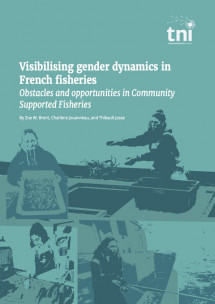Ideas into movement
Boost TNI's work
50 years. Hundreds of social struggles. Countless ideas turned into movement.
Support us as we celebrate our 50th anniversary in 2024.

Fisheries are one of Europe’s most challenging and dangerous employment sectors. While they remain a central pillar of the European food system, the sector still relies on strikingly unequal and gendered labour relations. This report looks at the French case, where women are the engine behind the commercialisation of local artisanal fish.

Fisheries are one of Europe’s most challenging and dangerous employment sectors. While they remain a central pillar of the European food system, the sector still relies on strikingly unequal and gendered labour relations. The work of capturing fish at sea has historically been masculinized, while the often unpaid work of managing accounts, repairs, sales and family care on land has been feminized. Masculinization of work at sea has been amplified as the fishing fleet has industrialized. This has also made it difficult for artisanal fishers to survive. Now, the sector faces a recruitment problem. Fewer and fewer people want to work in fisheries. The lack of formalized female workers has led to attempts to visibilise women fishers and to calls among our survey (further described below) respondents for outreach to women as a potential source of new energy and workers in the sector. This short report explores the context from which such attempts and calls have emerged.
First, we describe the gender relations and invisibilised labour of women in European fisheries. Then, we look at how women have historically struggled for more equal rights in the sector and the key issues women still face today. Finally, we zoom in on the gender dynamics in French fisheries, paying attention to the ways they intersect with ecological concerns and different models of fishing (from industrial boats to community supported fisheries), to demonstrate that simply hiring more women will not solve the deep social and ecological issues confronting this sector.
In line with what some researchers have flagged as a lack of attention in the fisheries sector to ‘women’s own perspective on how they value their own roles and identities in fishing,’6 this report attempts to give voice to women in the fisheries sector. This is especially important since, ‘although research on women in fishing has increasingly documented the multiple (re)productive roles that women in fishing practice around the world, comparatively little research has analysed what women’s changed contributions to fishing mean to these women — and, associated with this, how gender relations and identities are renegotiated with, and (re)shaped by, changing roles and practices.’ Our work is based on empirical data gathered by Pleine Mer, a French non-profit organisation defending artisanal fisheries, during three years of fieldwork among French fishers in the process of mapping direct sales of seafood coming from French harbours. Three in depth semi-structured interviews with women currently working in fisheries were also carried out, along with a survey about perceptions of gender dynamics in the sector to which 16 women and 16 men working in the sector or closely related industries responded. The survey offers a glimpse of some of the key issues in terms of gender relations in French fisheries today — from the perspective of both men and women. These varied perspectives compliment more in-depth interviews and ethnographic fieldwork listening to women and help visibilise and, ‘attend to gendered power relations and the potential (co-)existence of processes of masculinisation [in fishing].’
The main points highlighted in the following sections are: (i) a process of masculinization of work on fishing boats and (ii) feminization of work in the fishing sector on land — both of which contribute to unequal gender relations. The process of industrialisation of the fishing fleet has only exacerbated this dynamic, celebrating a productivist approach that seeks to maximise the quantity of fish caught, values male physical force, risk taking, heightened competition (among the industrial fishing fleet as well as with small-scale fishers) and extended periods at sea. This focus on quantity and efficiency has contributed to overfishing and undermines the ecological sustainability of European fisheries. Meanwhile women’s work on land is invisibilised and taken for granted, despite the fact that much of the fishing business would collapse without it. As the dominant model of fishing is confronted with the challenge of recruiting new workers, the reality that something needs to change socially and ecologically if fishing is going to be sustained, has become increasingly clear. A different approach to work and to nature is needed and it is precisely those who have been historically devalued in the sector who are already illustrating potential ways forward. One such alternative has recently been framed as community supported fisheries. Community supported fisheries (CSF) put fishers in direct relation with consumers and offer a potential strategy for supporting fishers who aim to break with the dominant model and prioritise quality over quantity. In the meantime, what is less understood, is the fact that without women’s work this strategy could not exist. This report looks at the French case, where women are the engine behind the commercialisation of local artisanal fish. In the French fishing sector we find that: